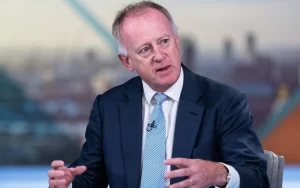
Cyclists should consider taking out insurance to safeguard themselves and pedestrians, according to John Neal, the chief executive of Lloyd’s of London, the world’s largest insurance market.
Neal’s comments come in response to a series of serious accidents involving cyclists, sparking renewed debate about the need for mandatory insurance.
Describing the idea of insurance for cyclists as not “such a daft idea,” Neal highlighted the importance of protecting all road users. The suggestion comes after a drunk cyclist recently avoided jail time despite hitting two women, resulting in severe injuries, including the amputation of a finger.
Neal, who is an avid cyclist himself, shared his personal experience of being knocked off his bicycle two and a half years ago. “I know what it’s like to be hit by somebody. So I think you could do with a bit of protection as well,” he remarked. Emphasising the importance of safety, he added, “I can’t comprehend why anybody would not wear a crash hat riding a bike.”
Currently, UK cyclists are not required by law to have insurance or register their bikes, as road laws apply only to “mechanically-propelled” vehicles. However, there are growing calls for change, particularly as the Government plans to introduce tougher laws targeting cyclists who cause deaths and injuries to pedestrians. These measures were initially proposed by the previous Conservative government but were put on hold before the general election.
Proponents of mandatory cycling insurance argue that it would improve road safety by holding cyclists accountable and discouraging reckless behaviour, such as running red lights. Despite this, Lloyd’s, which was founded in a 17th-century coffee shop near the Thames, does not currently offer cycle insurance. The company recently reported £4.9bn in pre-tax profits for the first half of 2024, marking a 25% increase compared to the same period last year.
In addition to discussing cycling safety, Neal cautioned the Labour government against excessive tax hikes and regulatory changes that could deter investment in the UK. With Chancellor Rachel Reeves expected to raise business taxes in the upcoming October Budget to address a £22bn deficit in public finances, Neal stressed the need for a balanced approach.
“We just want the UK to be sensible, fair and competitive,” he stated. “From a tax point of view, we should pay tax, both individually and corporately. And from a regulatory point of view, it’s important that the markets are looked over, looked after, overseen well and managed. But we need to ensure that we can remain competitive. We’ve got to be an attractive proposition globally for financial services.”
Read more:
Cyclists urged to consider insurance to enhance safety, says Lloyd’s chief





